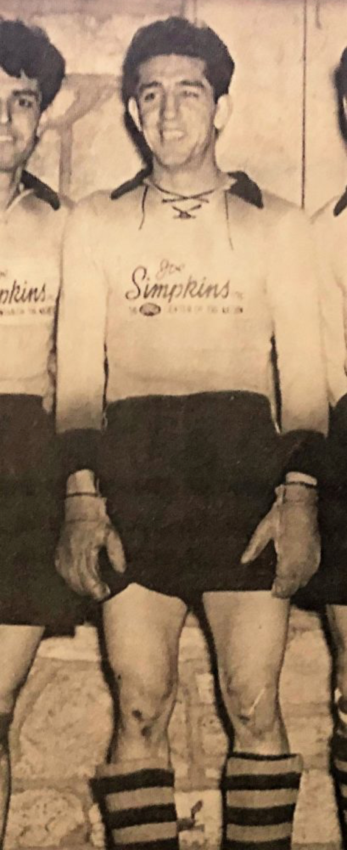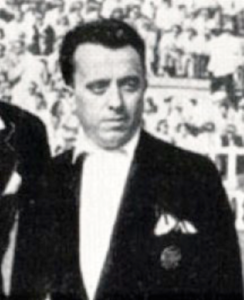On June 29, 1950, at the Estádio Independência in Belo Horizonte, in a group stage match that is still considered to be one of the greatest, if not the greatest, upset in World Cup history, a basically amateur U.S. national team defeated by the score of 1-0 a strong England side that was one of the favorites to win the tournament. England had almost all of the possession and many shots on goal but was unable to score. The U.S. had half a chance but was able to capitalize on it. At the 38th minute of the first half, U.S. captain Walter Bahr received a throw-in from Ed McIlvenny just inside the English midfield. He advanced and then, from about 25-30 yards hit the ball towards the far post of English goalkeeper, Bert Williams. It was a speculative attempt, neither a clear shot at goal nor a precise pass. Williams moved to his right to collect the effort but U.S. center forward Joe Gaetjens flung himself at the ball, and regardless of whether it was because of skill or luck, brushed it slightly with his head. Williams was caught wrong-footed and the ball ended up in the net to his left.

Besides the U.S. goal, the most remembered episode of the match occurred about seven or eight minutes before its end. Stanley Mortensen collected a loose ball in the center circle and ran towards the U.S. goal with only central defender Charles Colombo chasing him. Colombo, nicknamed ‘Gloves’ because he always played with a pair of leather mittens, was a rugged and very competitive player often described as a “wrecking machine.”[1] He was the kind of defender who would resort to anything to stop an adversary because, according to some of his teammates, “he took it as a personal insult if he was beaten” and, to avoid that, “he would have crippled even his grandmother.”[2] Another teammate, both on his club in St. Louis and on the national team, Gino Pariani, offers a qualification to this image: “They can say that he was a dirty player, but they didn’t come in the clubhouse after the games and see all the kicks and bruises that he had … And he had no hard feelings. If somebody kicked him, he wouldn’t say a word or anything like that.”[3]
Mortensen was a speedy player and Colombo immediately realized that he would not be able to catch up with him before the forward would be in a position to shoot, undisturbed, at goal. Thus, as Mortensen was approaching the penalty area, Colombo literally threw himself headfirst towards Mortensen and brought him down by catching his ankles with his hands, as one would in an American gridiron-football or rugby tackle. Such was the speed that the players’ momentum carried them both almost to the penalty spot.
The referee, Generoso Dattilo, from Italy, whistled the foul, ran towards Colombo, and said something to him. Because no other player, except Mortensen, was close enough to hear what Dattilo said, one has to rely on the account of the episode given by Colombo: “The referee come [sic] running up to me – he was an Italian referee – he’s shaking his finger at me and this and that and he kept saying ‘Buono! Buono!’ which means good.”[4] As another US player, defender Harry Keough, also from St. Louis, would later recall: “Charlie claimed that to his dying day.”[5]
This is not surprising since it was the truth, or, more precisely, the truth, as Colombo understood it. The problem with this story, in fact, is not what the referee said, but what the words he uttered really meant. I argue that both Colombo and the many journalists who have repeated this story in later years misunderstood the meaning of Dattilo’s words. Indeed, if one were to accept this version of the story the question arises: why would a referee endorse such a blatant foul to the point of congratulating the player responsible for it? Two players on the U.S. team, Bahr and Keough, have advanced two different hypotheses: Bahr believes that the referee’s remark “was probably a joke” while Keough has affirmed that since “the ref was Italian … and the Italian team were contenders” perhaps the referee preferred the U.S. to win the game and thus make it less likely that England would be in the final group stage. That, according to him, was the reason why the referee “didn’t kick Charlie out of the game.”[6]
Both explanations are unconvincing. Colombo’s foul was certainly theatrical, but it is difficult to imagine a referee willing to joke with the player responsible for it. Keough’s hypothesis is contradicted by at least three considerations. First, Italy was in a qualifying pool of only three teams, and had lost the first game to Sweden 3-2, which made it highly unlikely that it would advance to the final group of 4 (composed of the winners of each of the four pools). Not only would Italy have to beat Paraguay in its remaining match but the team also had to hope that Paraguay would beat Sweden. As it happened, while the U.S. was beating England in Belo Horizonte, in Curitiba, Sweden and Paraguay drew 2-2 thus making Italy’s final game against Paraguay totally irrelevant. Second, although Dattilo could not have known the result of the match in Curitiba, it is, nevertheless, highly unlikely that nationalistic sentiment would have influenced his behavior. Dattilo had been an international referee since 1934, and in the 1939-40 season, he had received both the ‘Mauro prize’ as best Italian referee and the FIFA gold medal as best international referee for that year (to this day he is the only Italian referee to have received it). Third, Dattilo did not send Colombo off, as he would have to do today, not because he was being “true to his given name” as one author, Donn Risolo, has cleverly suggested (Generoso in Italian means ‘generous’).[7] In 1950, denial of a goal-scoring opportunity did not call for an automatic sending-off. It was up to the referee to decide whether a player was guilty of “violent conduct or serious foul play,” both of which called for a sending-off. In this case, Dattilo probably felt that the preposterousness and comicality of Colombo’s foul trumped both its seriousness and violence. So, how can one explain what happened?

The story, as we have noted, was related by Colombo himself. He was a second-generation Italian born in St. Louis of Lombard parents coming from small villages west of Milan and north of Pavia.[8] Like the majority of first-generation Italian-Americans at the time, he probably had learned bits and pieces of the Lombard dialect spoken by his parents at home but was not likely to be fluent in Italian and certainly unfamiliar with the subtleties of the Roman dialect spoken by the referee. Dattilo was born, and lived all his life, in Rome and hence, more than likely, like most Romans he expressed himself in the dialect of that city. Therefore, I believe Dattilo spoke to Colombo in the Roman dialect. Colombo thought he had heard the words ‘Buono! Buono!’ But Dattilo, most likely, shouted instead the Roman expression ‘Bono! Bono!’ which is pronounced with a very open and very long first o and a closed and much shorter second o, i.e. bɔ:no! bɔ:no!. Colombo understood the expression to mean ‘good,’ and took it as a compliment although as he also reported, the referee was shaking his finger at him. Risolo, in writing about this episode, goes even further and translates Dattilo’s expression as “Good job! Way to go.”[9]
Colombo, and Risolo later, misunderstood the meaning of Dattilo’s words for two reasons. The first is that, had the referee really wanted to compliment Colombo, as the latter thought, or meant to say something like “Good job! Way to go” as Risolo writes, then he would not have used the adjective ‘buono.’ In Italian soccer language, the adjective ‘buono’ is used only with reference to the ball, to signal to a player that he is not offside or that the game has not been stopped and that therefore he can play the ball. In Italian, moreover, the term ball is of the feminine gender and hence the adjective would have had to be in the feminine (hence ‘buona! buona!’). Under the circumstances, however – Dattilo had whistled a foul and interrupted the match – the use of the adjective ‘buona’ with reference to the ball would not have made any sense. Had the referee meant to compliment Colombo with a “Well done! Good job!” or “Way to go,” he would have most likely used expressions such as: ‘Bravo, bravo’ or ‘Bene, bene’ or ‘Ben fatto.’ ‘Bono!’ is the translation of the Italian adjective ‘buono’ in Roman dialect but the expression ‘Bono! Bono!’ in Roman dialect does not mean ‘Good! Good!’ It translates instead as: ‘Calm down, stay calm’ and is used primarily with restless animals (e.g. addressing a dog running barking towards you) but also with individuals who have lost their temper and are about to strike someone or have already dealt the first blow. It is always pronounced while raising the index finger and moving it slightly, but repeatedly, up and down, as Colombo indicated that Dasttilo was doing.
So, far from congratulating Colombo, Dattilo was really warning him and implying, more subtly, that he had behaved like an animal. The meaning of the referee’s words was lost in translation and Dattilo’s warning was taken as an unlikely compliment that has since entered soccer folklore as one of the defining events in the greatest upset of the 20th century.
This essay is a condensed version of O. Croci, O. “Twice lost in translation: what referee Dattilo really said to Colombo in the greatest upset in World Cup history, England v USA, 1950” Soccer and Society, 20 (6), 2019: 848-854. https://doi.org/10.1080/14660970.2018.1425683
Endnotes
[1] G. Douglas, The game of their lives. The untold story of the World Cup’s biggest upset (New York: HarperCollins, 1996), 33
[2] J. Carlisle, “Remembering the USA’s 1-0 upset of England in 1950.” ABC7NY Eyewitness News, June 6, 2014. https://abc7ny.com/espn-fifa-world-cup/96913/ (accessed April 30, 2020) and Douglas, op. cit., 22
[3] G. L. Jones, “The upset that shocked the world: there is more to the story of America’s World Cup win over England in 1950 than just soccer.” Los Angeles Times, June 16, 1985. http://articles.latimes.com/1985-06-16/sports/sp-2826_1_world-cup (accessed March 27, 2017).
[4] Ibid. See also S. Burnton, “England return to Belo Horizonte, the scene of their worst defeat.” The Guardian, June 21, 2014. http://www.theguardian.com/football/blog/2014/jun/21/england-belo-horizonte-us-costa-rica-world-cup (accessed March 27, 2017).
[5] B. Trusdell, “Soccer’s all-time upset.” Los Angeles Times, July 2, 2000. http://articles.latimes.com/2000/jul/02/sports/sp-47138 (accessed March 27, 2017).
[6] J. Longman, “How a ‘Band of No-Hopers’ forged U.S. soccer finest day.” The New York Times.com, December 9, 2009. https://www.nytimes.com/2009/12/10/sports/soccer/10soccer.html?pagewanted=all&_r=0 (accessed April 30, 2020) and Douglas, op. cit., 132.
[7] D. Risolo, Soccer Stories: Anecdotes, Oddities, Lore, and Amazing Feats, Lincoln: University of Nebraska Press, 2010.
[8] So, incidentally, were two other players on that team that day: goalkeeper Frank Borghi and the already mentioned Pariani.
[9] Risolo, op. cit., 171-2.

Hi Osvaldo, assuming you are healthy with spirits flying high. Isn’t working remotely from home not only a modern but as well quite acceptable job? Politics and sports seem to me a worthwhile academic field for further research. I guess your way of going into cases of sports history provides satisfaction and fun to yourself. In addition, I wish you lots of attention from friends, students, the public and foreign fans.
Like you, I’m very busy. Teaching complimentary coaching lessons to four students from 9 to 19 years old, all kids of migrants, or refugees themselves, keeps me going. Certainly, all happens remotely from home via Teamviewer. Life is all but boring!
With many regards I am hoping to meet you again the next time you return to Old-Europe
Cordialmente Uli
Hello Osvaldo, Soccer in the US is interesting but I have a question that what are the reasons that the US is not able to win the soccer world cup?
Hi John
I am sorry that I come back so late, but saw your question only today.
I am pretty sure tha the US will be in a position to compete for winning a world cup some time in the future. It is a question of competing at a high level for some time and have players that are playing in very competitive leagues. The US has very few players like that at the moment. As men’s soccer becomes more widespread, the US is in a very good position to become much more competitive. The no of people living in teh country is not that important in this respect other wise, China, India and Indonesia or Russia would be the stars, which they are not. You would not expect to see Belgium and the Netherlands at the top but they are, because their players play in very competitive leagues.